
bytebot
Bytebot is a self-hosted AI desktop agent that automates computer tasks through natural language commands, operating within a containerized Linux desktop environment.
Stars: 6620
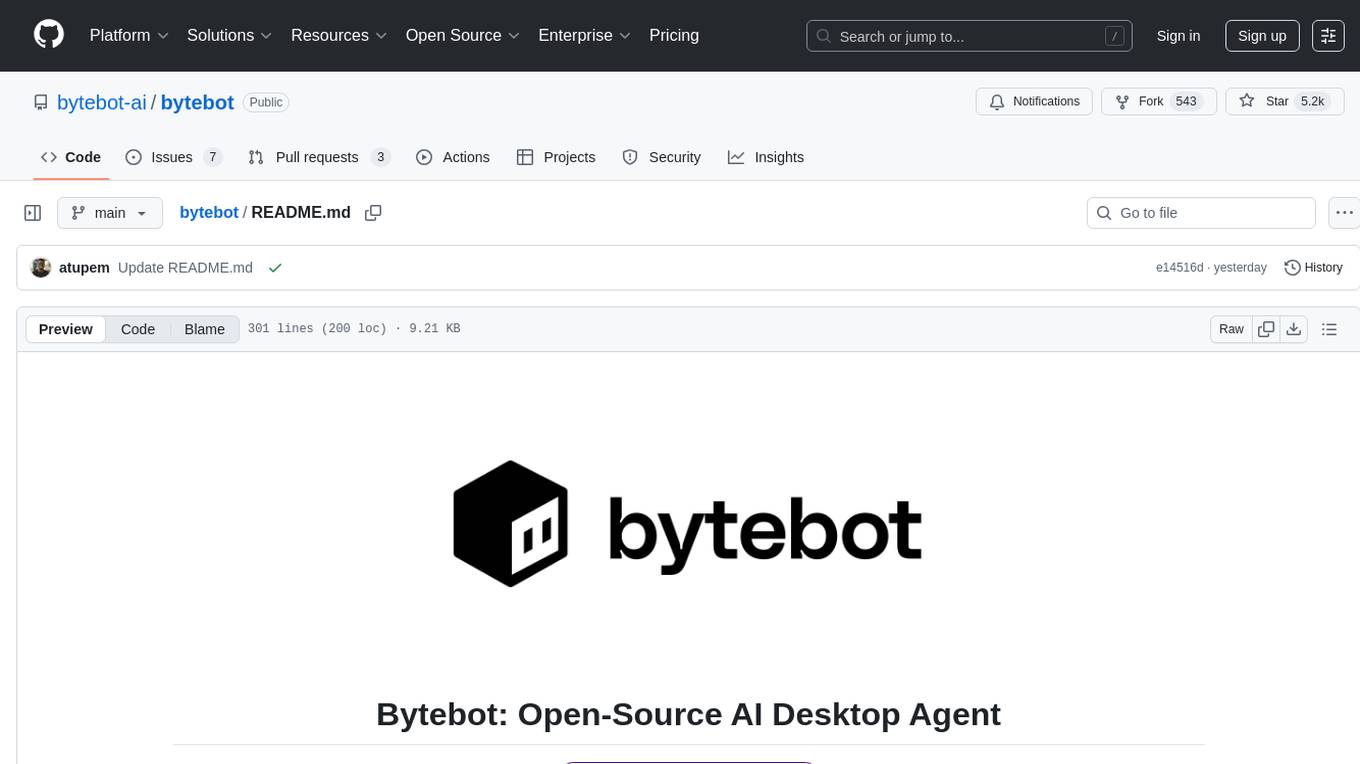
Bytebot is an open-source AI desktop agent that provides a virtual employee with its own computer to complete tasks for users. It can use various applications, download and organize files, log into websites, process documents, and perform complex multi-step workflows. By giving AI access to a complete desktop environment, Bytebot unlocks capabilities not possible with browser-only agents or API integrations, enabling complete task autonomy, document processing, and usage of real applications.
README:

An AI that has its own computer to complete tasks for you
🌐 Website • 📚 Documentation • 💬 Discord • 𝕏 Twitter
Deutsch | Español | français | 日本語 | 한국어 | Português | Русский | 中文
https://github.com/user-attachments/assets/f271282a-27a3-43f3-9b99-b34007fdd169
https://github.com/user-attachments/assets/72a43cf2-bd87-44c5-a582-e7cbe176f37f
A desktop agent is an AI that has its own computer. Unlike browser-only agents or traditional RPA tools, Bytebot comes with a full virtual desktop where it can:
- Use any application (browsers, email clients, office tools, IDEs)
- Download and organize files with its own file system
- Log into websites and applications using password managers
- Read and process documents, PDFs, and spreadsheets
- Complete complex multi-step workflows across different programs
Think of it as a virtual employee with their own computer who can see the screen, move the mouse, type on the keyboard, and complete tasks just like a human would.
When AI has access to a complete desktop environment, it unlocks capabilities that aren't possible with browser-only agents or API integrations:
Give Bytebot a task like "Download all invoices from our vendor portals and organize them into a folder" and it will:
- Open the browser
- Navigate to each portal
- Handle authentication (including 2FA via password managers)
- Download the files to its local file system
- Organize them into a folder
Upload files directly to Bytebot's desktop and it can:
- Read entire PDFs into its context
- Extract data from complex documents
- Cross-reference information across multiple files
- Create new documents based on analysis
- Handle formats that APIs can't access
Bytebot isn't limited to web interfaces. It can:
- Use desktop applications like text editors, VS Code, or email clients
- Run scripts and command-line tools
- Install new software as needed
- Configure applications for specific workflows
Just click and add your AI provider API key.
Option 2: Docker Compose
git clone https://github.com/bytebot-ai/bytebot.git
cd bytebot
# Add your AI provider key (choose one)
echo "ANTHROPIC_API_KEY=sk-ant-..." > docker/.env
# Or: echo "OPENAI_API_KEY=sk-..." > docker/.env
# Or: echo "GEMINI_API_KEY=..." > docker/.env
docker-compose -f docker/docker-compose.yml up -d
# Open http://localhost:9992Bytebot consists of four integrated components:
- Virtual Desktop: A complete Ubuntu Linux environment with pre-installed applications
- AI Agent: Understands your tasks and controls the desktop to complete them
- Task Interface: Web UI where you create tasks and watch Bytebot work
- APIs: REST endpoints for programmatic task creation and desktop control
- Natural Language Tasks: Just describe what you need done
- File Uploads: Drop files onto tasks for Bytebot to process
- Live Desktop View: Watch Bytebot work in real-time
- Takeover Mode: Take control when you need to help or configure something
- Password Manager Support: Install 1Password, Bitwarden, etc. for automatic authentication
- Persistent Environment: Install programs and they stay available for future tasks
"Go to Wikipedia and create a summary of quantum computing"
"Research flights from NYC to London and create a comparison document"
"Take screenshots of the top 5 news websites"
"Read the uploaded contracts.pdf and extract all payment terms and deadlines"
"Process these 5 invoice PDFs and create a summary report"
"Download and analyze the latest financial report and answer: What were the key risks mentioned?"
"Download last month's bank statements from our three banks and consolidate them"
"Check all our vendor portals for new invoices and create a summary report"
"Log into our CRM, export the customer list, and update records in the ERP system"
import requests
# Simple task
response = requests.post('http://localhost:9991/tasks', json={
'description': 'Download the latest sales report and create a summary'
})
# Task with file upload
files = {'files': open('contracts.pdf', 'rb')}
response = requests.post('http://localhost:9991/tasks',
data={'description': 'Review these contracts for important dates'},
files=files
)# Take a screenshot
curl -X POST http://localhost:9990/computer-use \
-H "Content-Type: application/json" \
-d '{"action": "screenshot"}'
# Click at specific coordinates
curl -X POST http://localhost:9990/computer-use \
-H "Content-Type: application/json" \
-d '{"action": "click_mouse", "coordinate": [500, 300]}'Use one of the deployment methods above to get Bytebot running.
Use the Desktop tab in the UI to:
- Install additional programs you need
- Set up password managers for authentication
- Configure applications with your preferences
- Log into websites you want Bytebot to access
Create tasks in natural language and watch Bytebot complete them using the configured desktop.
- Invoice processing and data extraction
- Multi-system data synchronization
- Report generation from multiple sources
- Compliance checking across platforms
- Automated UI testing
- Cross-browser compatibility checks
- Documentation generation with screenshots
- Code deployment verification
- Competitive analysis across websites
- Data gathering from multiple sources
- Document analysis and summarization
- Market research compilation
Bytebot is built with:
- Desktop: Ubuntu 22.04 with XFCE, Firefox, VS Code, and other tools
- Agent: NestJS service that coordinates AI and desktop actions
- UI: Next.js application for task management
- AI Support: Works with Anthropic Claude, OpenAI GPT, Google Gemini
- Deployment: Docker containers for easy self-hosting
- Data Privacy: Everything runs on your infrastructure
- Full Control: Customize the desktop environment as needed
- No Limits: Use your own AI API keys without platform restrictions
- Flexibility: Install any software, access any systems
Use any AI provider through our LiteLLM integration:
- Azure OpenAI
- AWS Bedrock
- Local models via Ollama
- 100+ other providers
Deploy on Kubernetes with Helm:
# Clone the repository
git clone https://github.com/bytebot-ai/bytebot.git
cd bytebot
# Install with Helm
helm install bytebot ./helm \
--set agent.env.ANTHROPIC_API_KEY=sk-ant-...- Discord: Join our community for help and discussions
- Documentation: Comprehensive guides at docs.bytebot.ai
- GitHub Issues: Report bugs and request features
We welcome contributions! Whether it's:
- 🐛 Bug fixes
- ✨ New features
- 📚 Documentation improvements
- 🌐 Translations
Please:
- Check existing issues first
- Open an issue to discuss major changes
- Submit PRs with clear descriptions
- Join our Discord to discuss ideas
Bytebot is open source under the Apache 2.0 license.
Give your AI its own computer. See what it can do.
Built by Tantl Labs and the open source community
For Tasks:
Click tags to check more tools for each tasksFor Jobs:
Alternative AI tools for bytebot
Similar Open Source Tools

bytebot
Bytebot is an open-source AI desktop agent that provides a virtual employee with its own computer to complete tasks for users. It can use various applications, download and organize files, log into websites, process documents, and perform complex multi-step workflows. By giving AI access to a complete desktop environment, Bytebot unlocks capabilities not possible with browser-only agents or API integrations, enabling complete task autonomy, document processing, and usage of real applications.
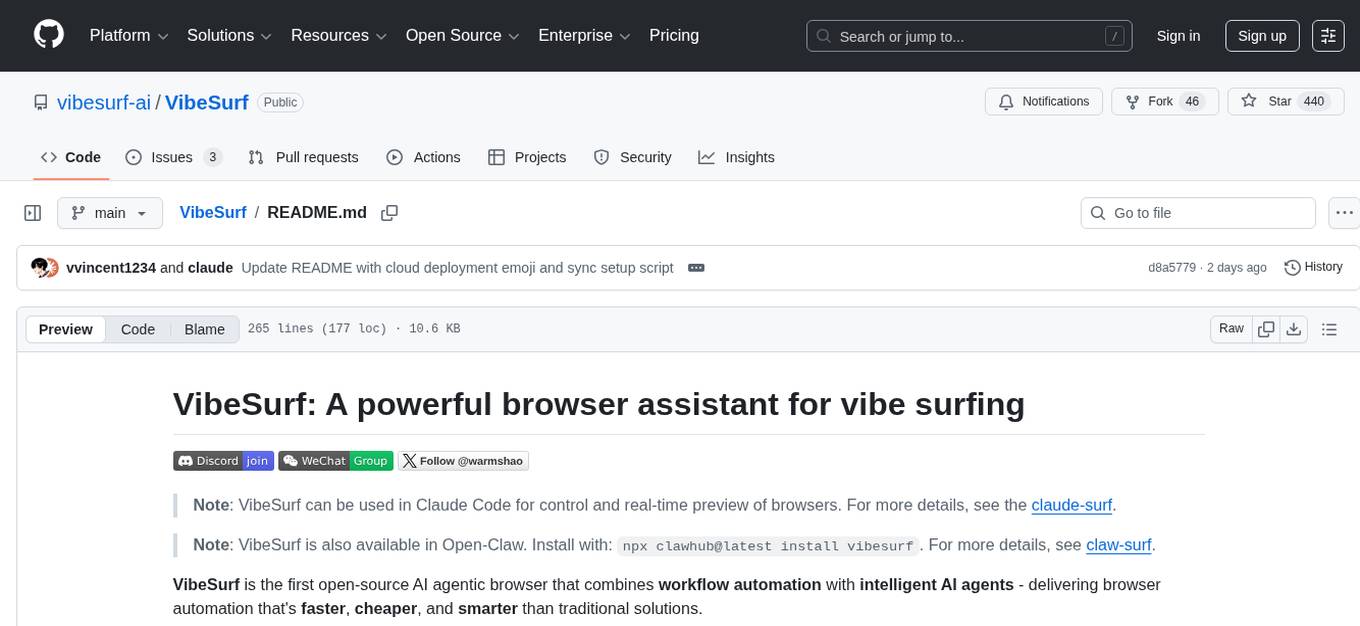
VibeSurf
VibeSurf is an open-source AI agentic browser that combines workflow automation with intelligent AI agents, offering faster, cheaper, and smarter browser automation. It allows users to create revolutionary browser workflows, run multiple AI agents in parallel, perform intelligent AI automation tasks, maintain privacy with local LLM support, and seamlessly integrate as a Chrome extension. Users can save on token costs, achieve efficiency gains, and enjoy deterministic workflows for consistent and accurate results. VibeSurf also provides a Docker image for easy deployment and offers pre-built workflow templates for common tasks.
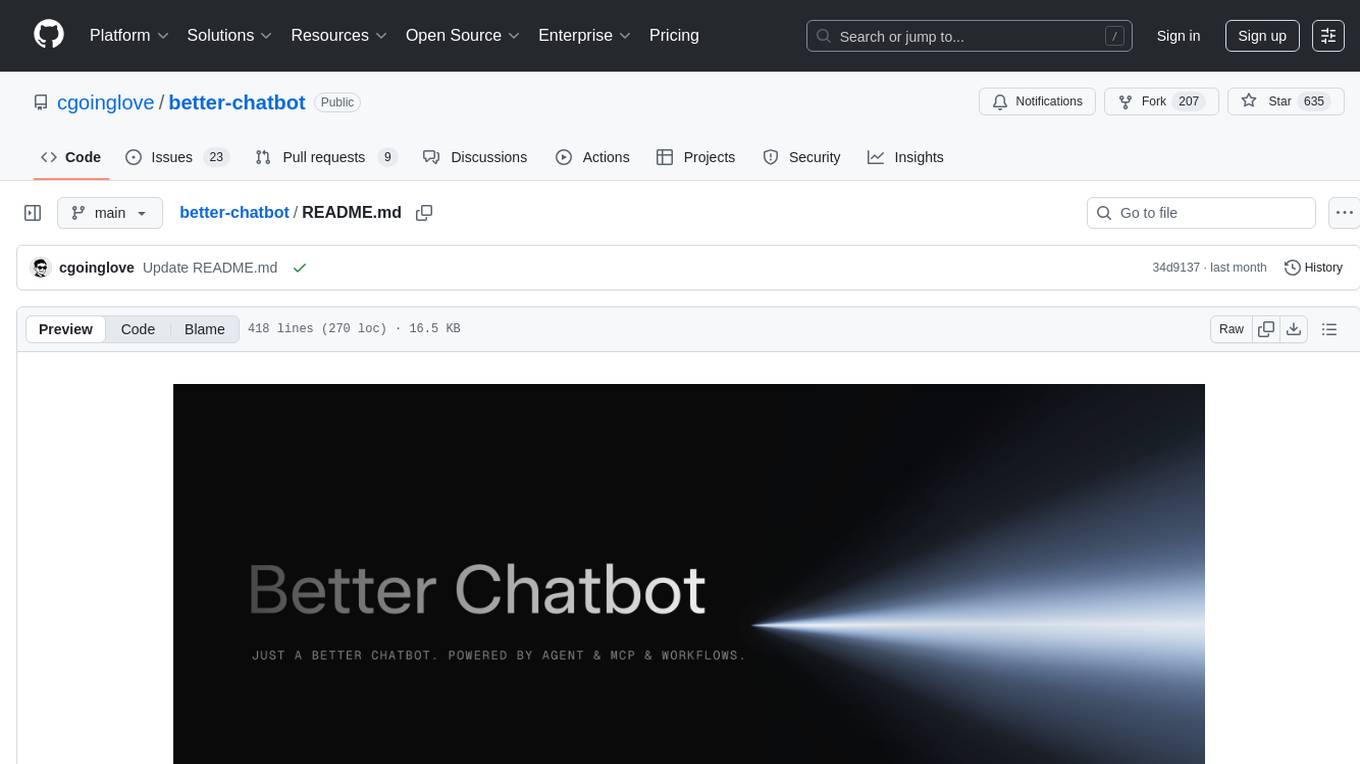
better-chatbot
Better Chatbot is an open-source AI chatbot designed for individuals and teams, inspired by various AI models. It integrates major LLMs, offers powerful tools like MCP protocol and data visualization, supports automation with custom agents and visual workflows, enables collaboration by sharing configurations, provides a voice assistant feature, and ensures an intuitive user experience. The platform is built with Vercel AI SDK and Next.js, combining leading AI services into one platform for enhanced chatbot capabilities.
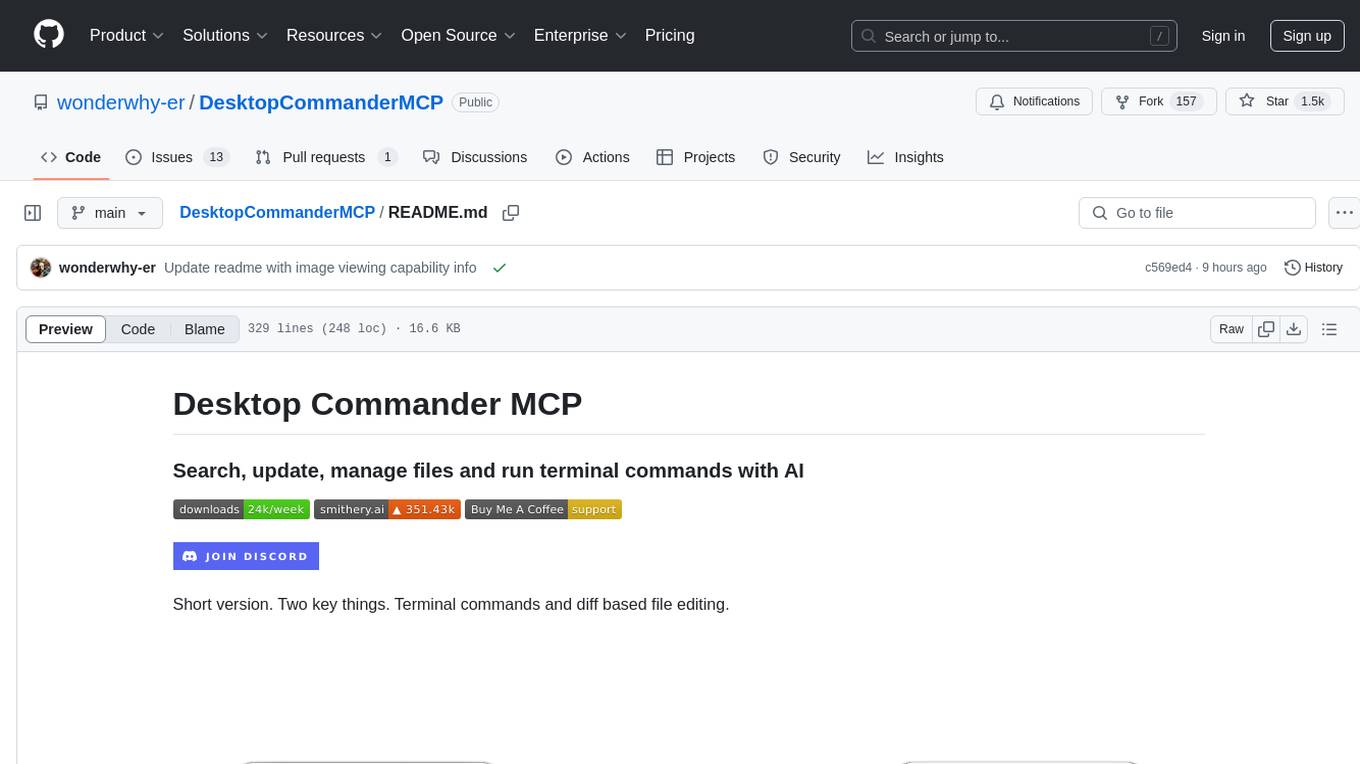
DesktopCommanderMCP
Desktop Commander MCP is a server that allows the Claude desktop app to execute long-running terminal commands on your computer and manage processes through Model Context Protocol (MCP). It is built on top of MCP Filesystem Server to provide additional search and replace file editing capabilities. The tool enables users to execute terminal commands with output streaming, manage processes, perform full filesystem operations, and edit code with surgical text replacements or full file rewrites. It also supports vscode-ripgrep based recursive code or text search in folders.
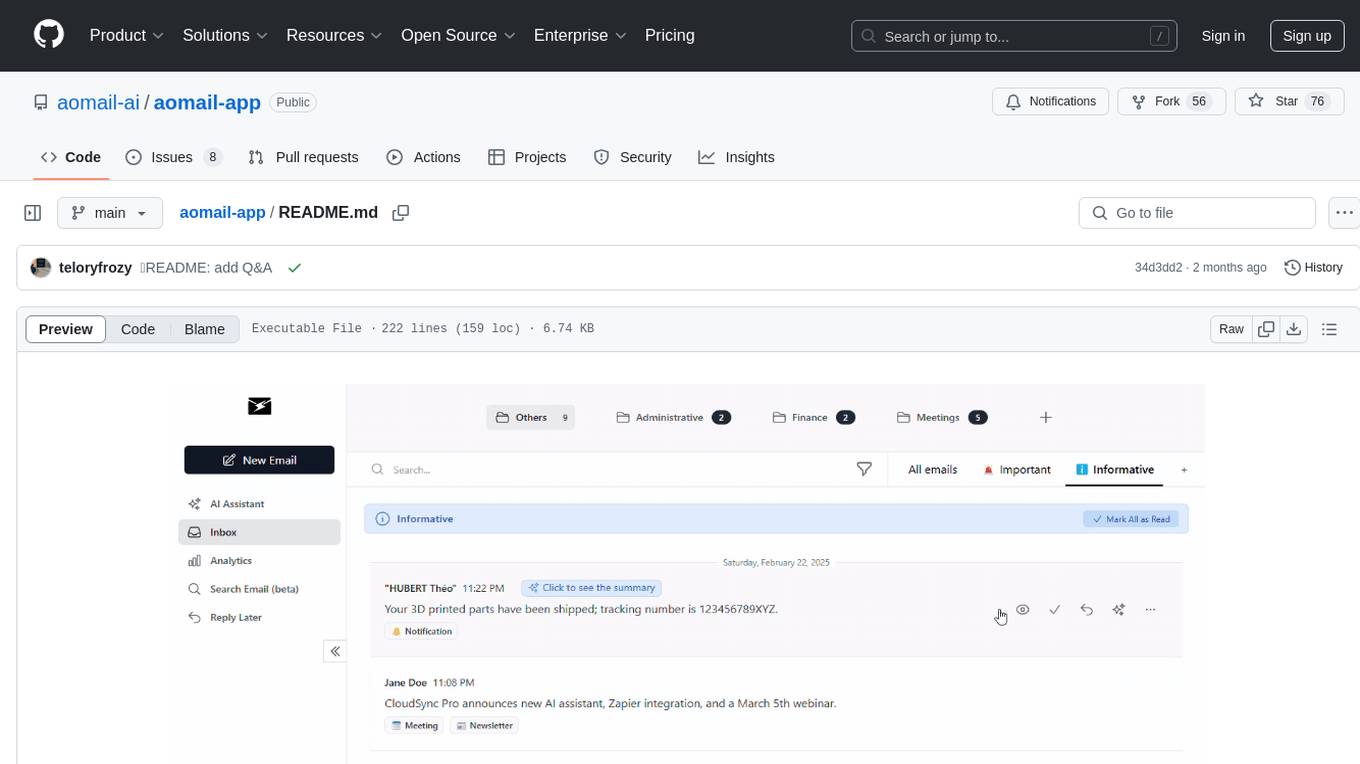
aomail-app
Aomail is an intelligent, open-source email management platform with AI capabilities. It offers email provider integration, AI-powered tools for smart categorization and assistance, analytics and management features. Users can self-host for complete control. Coming soon features include AI custom rules, platform integration with Discord & Slack, and support for various AI providers. The tool is designed to revolutionize email management by providing advanced AI features and analytics.
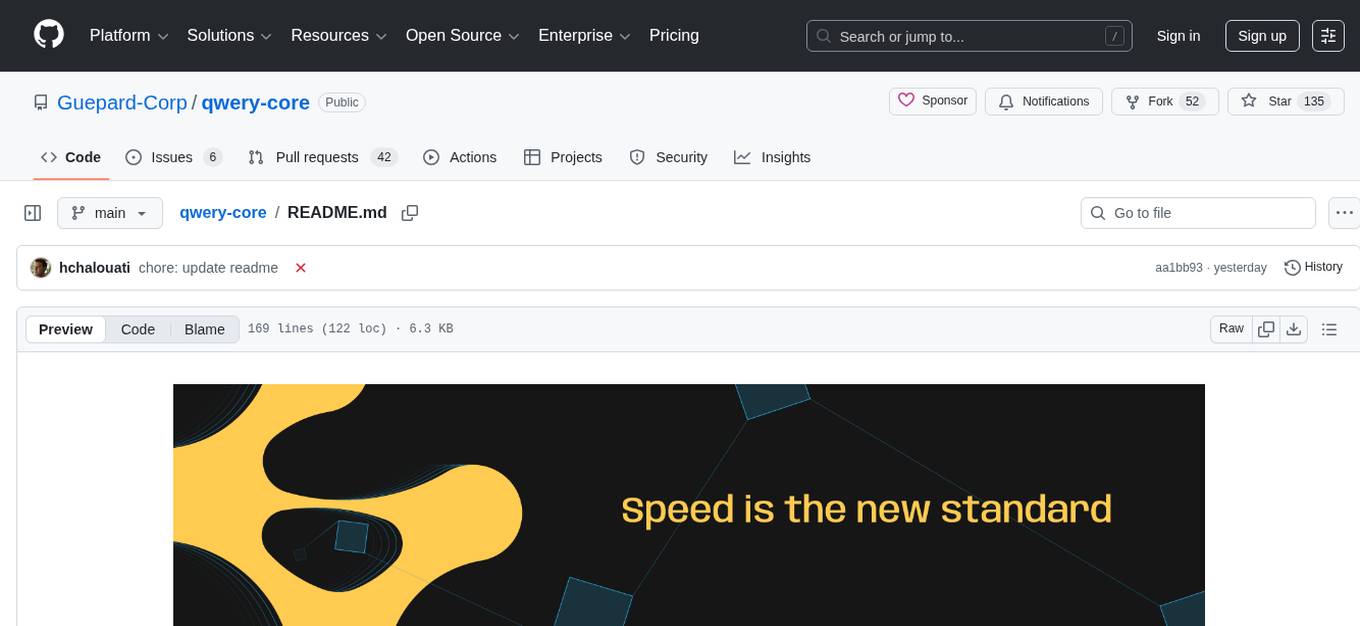
qwery-core
Qwery is a platform for querying and visualizing data using natural language without technical knowledge. It seamlessly integrates with various datasources, generates optimized queries, and delivers outcomes like result sets, dashboards, and APIs. Features include natural language querying, multi-database support, AI-powered agents, visual data apps, desktop & cloud options, template library, and extensibility through plugins. The project is under active development and not yet suitable for production use.
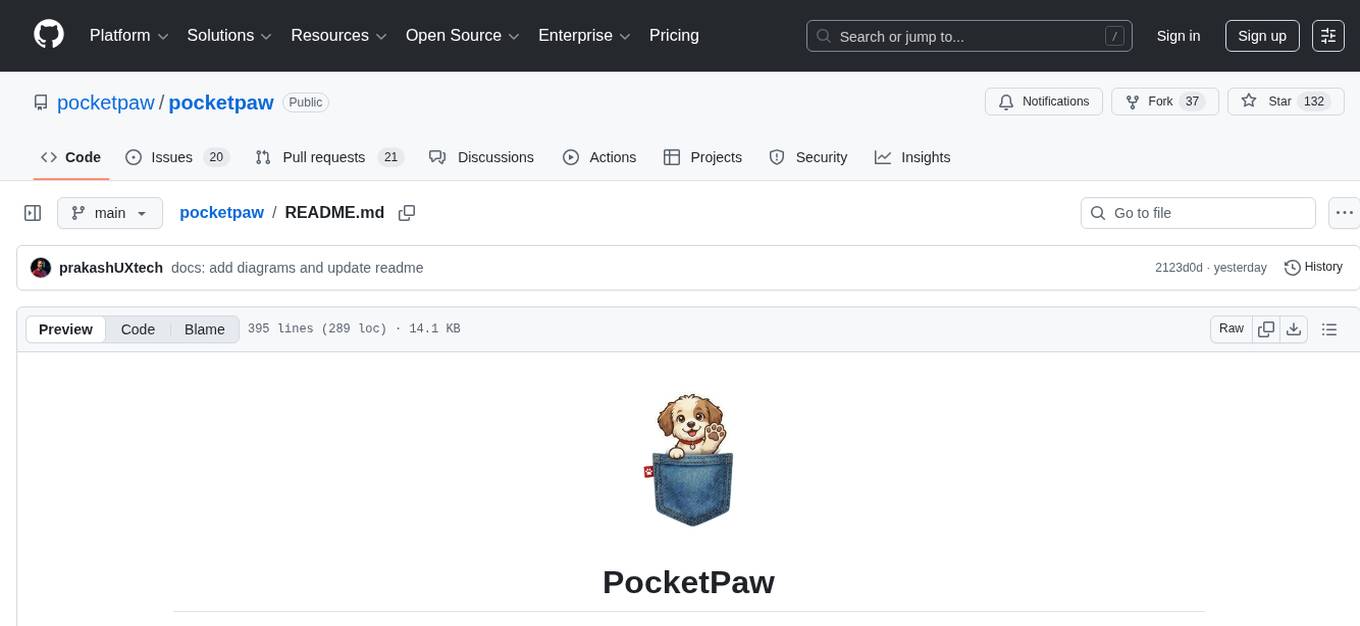
pocketpaw
PocketPaw is a lightweight and user-friendly tool designed for managing and organizing your digital assets. It provides a simple interface for users to easily categorize, tag, and search for files across different platforms. With PocketPaw, you can efficiently organize your photos, documents, and other files in a centralized location, making it easier to access and share them. Whether you are a student looking to organize your study materials, a professional managing project files, or a casual user wanting to declutter your digital space, PocketPaw is the perfect solution for all your file management needs.

TaskingAI
TaskingAI brings Firebase's simplicity to **AI-native app development**. The platform enables the creation of GPTs-like multi-tenant applications using a wide range of LLMs from various providers. It features distinct, modular functions such as Inference, Retrieval, Assistant, and Tool, seamlessly integrated to enhance the development process. TaskingAI’s cohesive design ensures an efficient, intelligent, and user-friendly experience in AI application development.
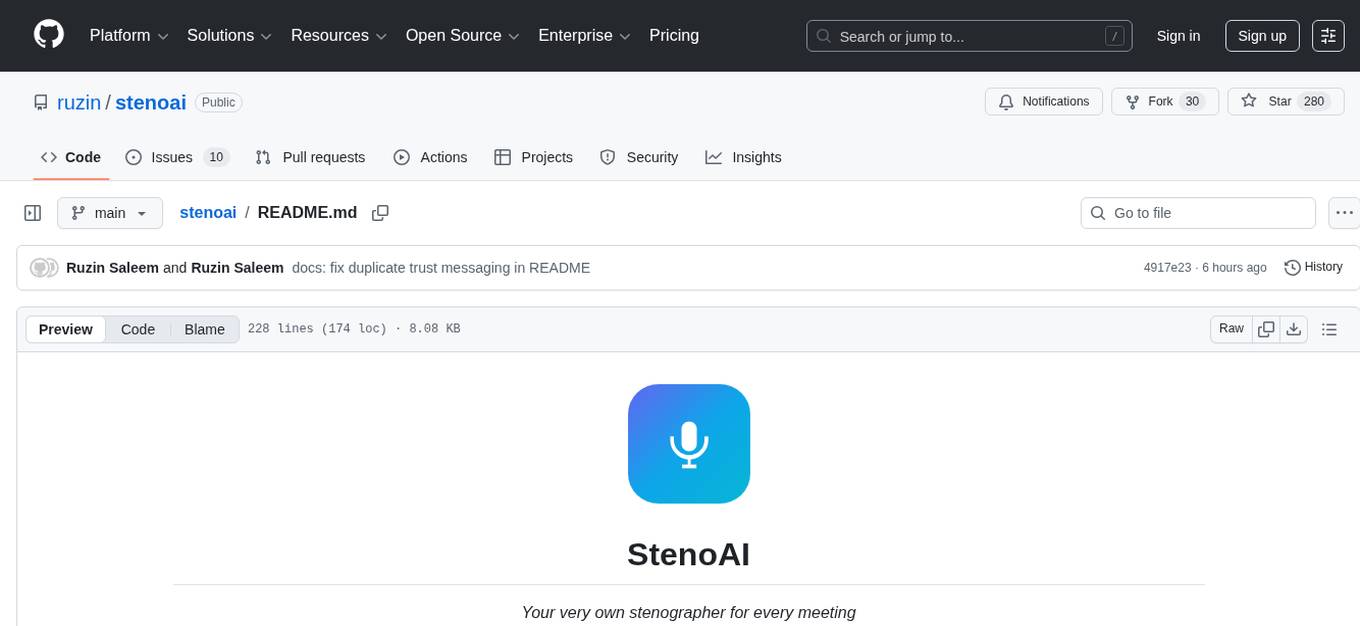
stenoai
StenoAI is an AI-powered meeting intelligence tool that allows users to record, transcribe, summarize, and query meetings using local AI models. It prioritizes privacy by processing data entirely on the user's device. The tool offers multiple AI models optimized for different use cases, making it ideal for healthcare, legal, and finance professionals with confidential data needs. StenoAI also features a macOS desktop app with a user-friendly interface, making it convenient for users to access its functionalities. The project is open-source and not affiliated with any specific company, emphasizing its focus on meeting-notes productivity and community collaboration.
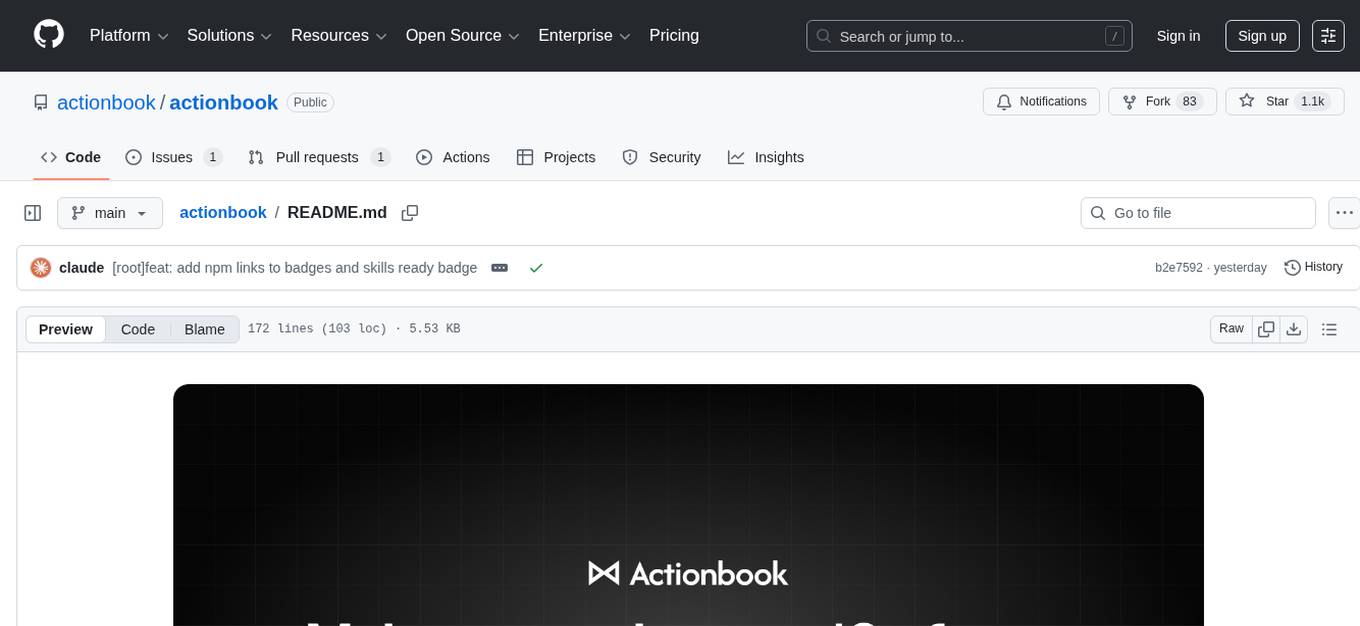
actionbook
Actionbook is a browser action engine designed for AI agents, providing up-to-date action manuals and DOM structure to enable instant website operations without guesswork. It offers faster execution, token savings, resilient automation, and universal compatibility, making it ideal for building reliable browser agents. Actionbook integrates seamlessly with AI coding assistants and offers three integration methods: CLI, MCP Server, and JavaScript SDK. The tool is well-documented and actively developed in a monorepo setup using pnpm workspaces and Turborepo.
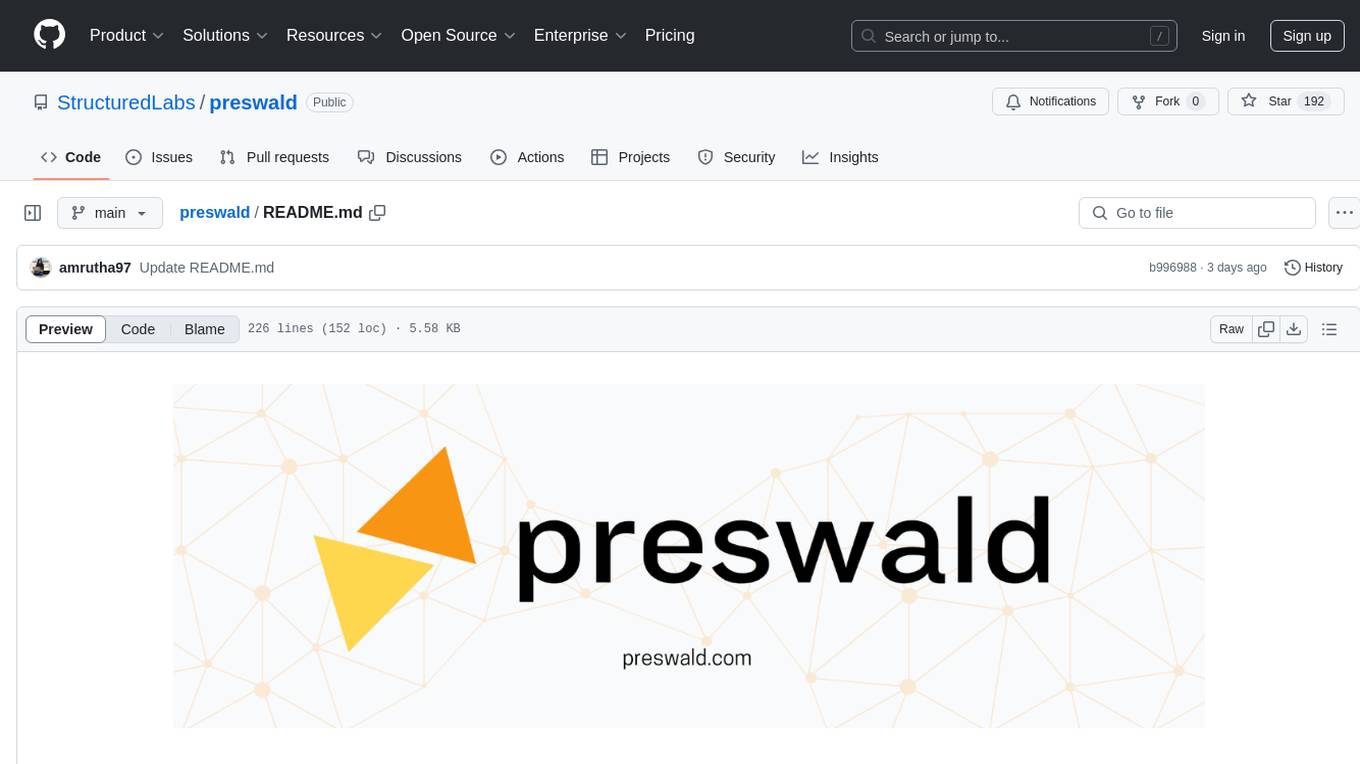
preswald
Preswald is a full-stack platform for building, deploying, and managing interactive data applications in Python. It simplifies the process by combining ingestion, storage, transformation, and visualization into one lightweight SDK. With Preswald, users can connect to various data sources, customize app themes, and easily deploy apps locally. The platform focuses on code-first simplicity, end-to-end coverage, and efficiency by design, making it suitable for prototyping internal tools or deploying production-grade apps with reduced complexity and cost.
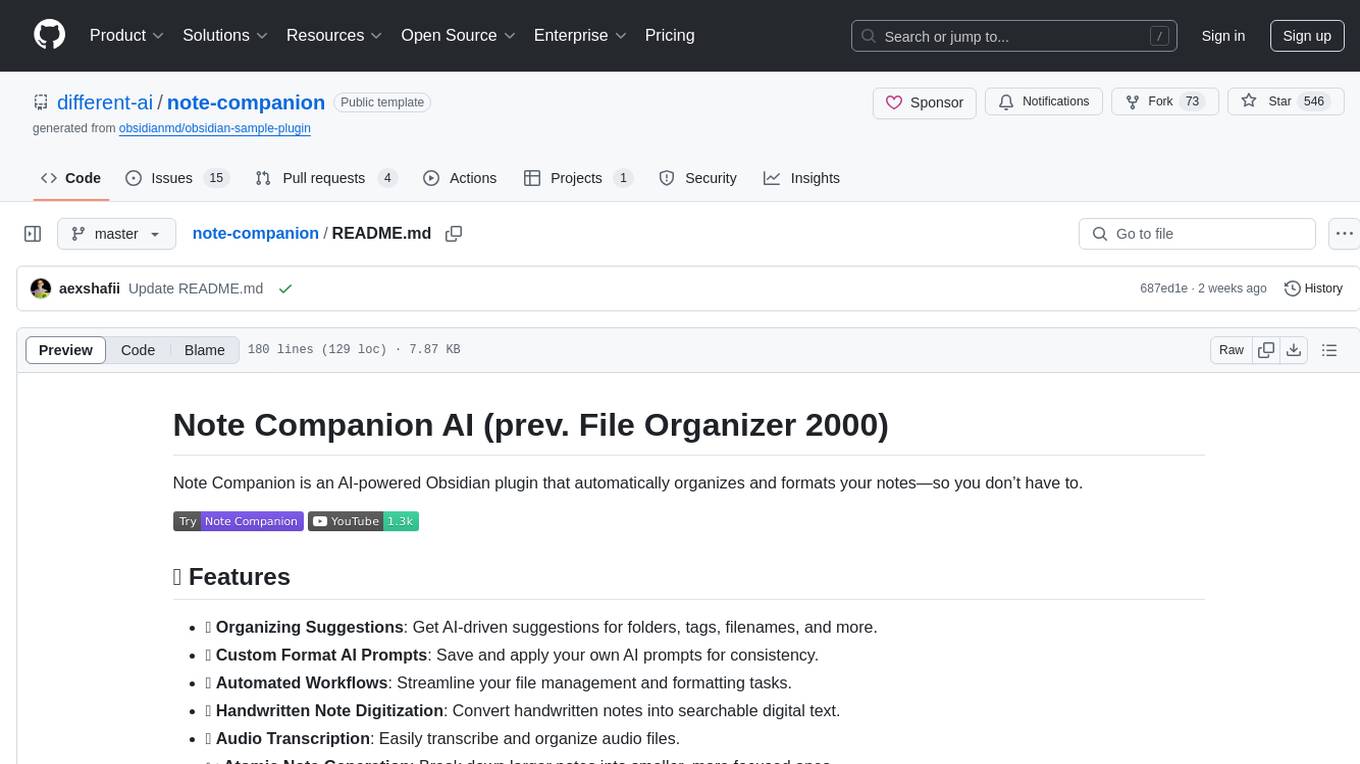
note-companion
Note Companion is an AI-powered Obsidian plugin that automatically organizes and formats notes. It provides organizing suggestions, custom format AI prompts, automated workflows, handwritten note digitization, audio transcription, atomic note generation, YouTube summaries, and context-aware AI chat. Key use cases include smart vault management, handwritten notes digitization, and intelligent meeting notes. The tool offers advanced features like custom AI templates and multi-modal support for processing various content types. Users can seamlessly integrate with mobile workflows and utilize iOS shortcuts for sending Apple Notes to Obsidian. Note Companion enhances productivity by streamlining note organization and management tasks with AI assistance.
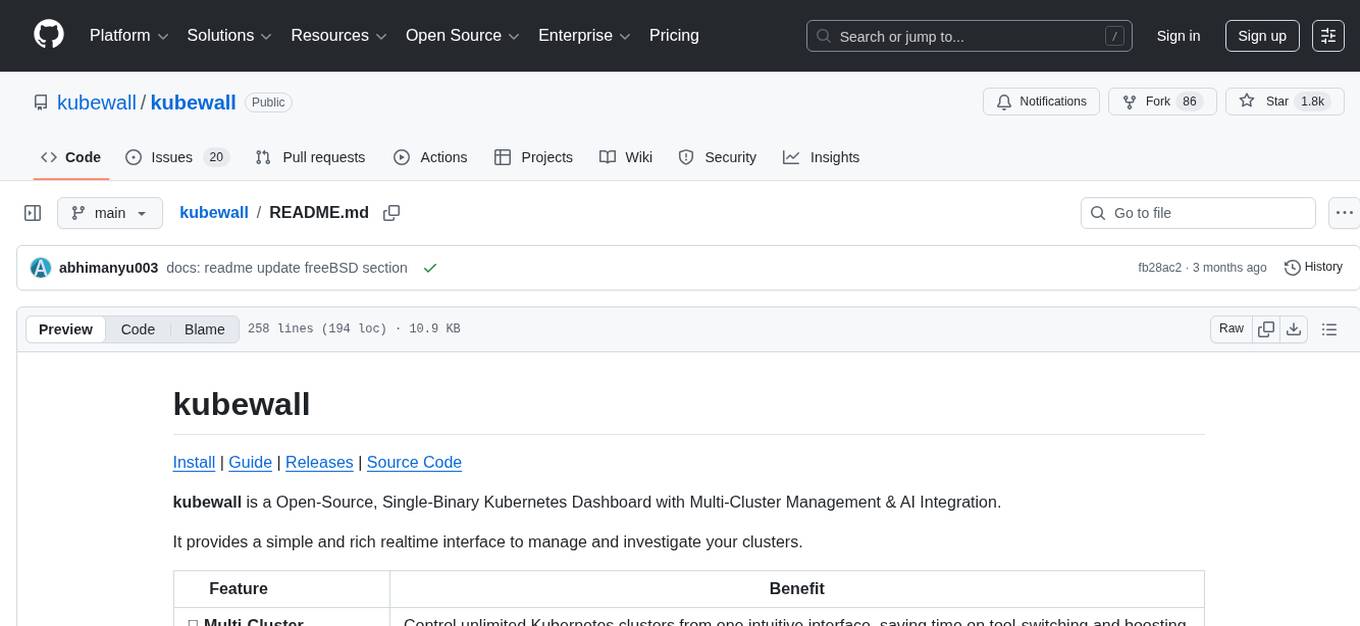
kubewall
kubewall is an open-source, single-binary Kubernetes dashboard with multi-cluster management and AI integration. It provides a simple and rich real-time interface to manage and investigate your clusters. With features like multi-cluster management, AI-powered troubleshooting, real-time monitoring, single-binary deployment, in-depth resource views, browser-based access, search and filter capabilities, privacy by default, port forwarding, live refresh, aggregated pod logs, and clean resource management, kubewall offers a comprehensive solution for Kubernetes cluster management.
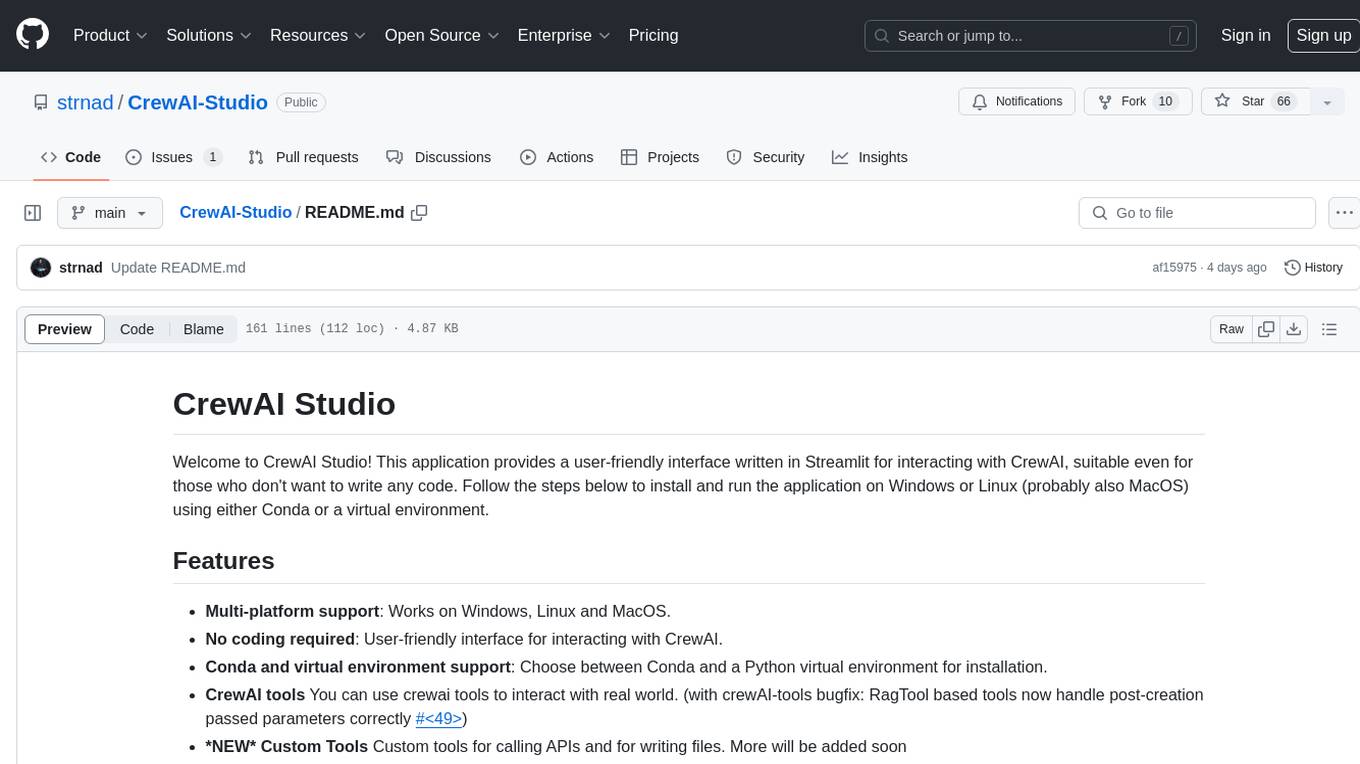
CrewAI-Studio
CrewAI Studio is an application with a user-friendly interface for interacting with CrewAI, offering support for multiple platforms and various backend providers. It allows users to run crews in the background, export single-page apps, and use custom tools for APIs and file writing. The roadmap includes features like better import/export, human input, chat functionality, automatic crew creation, and multiuser environment support.
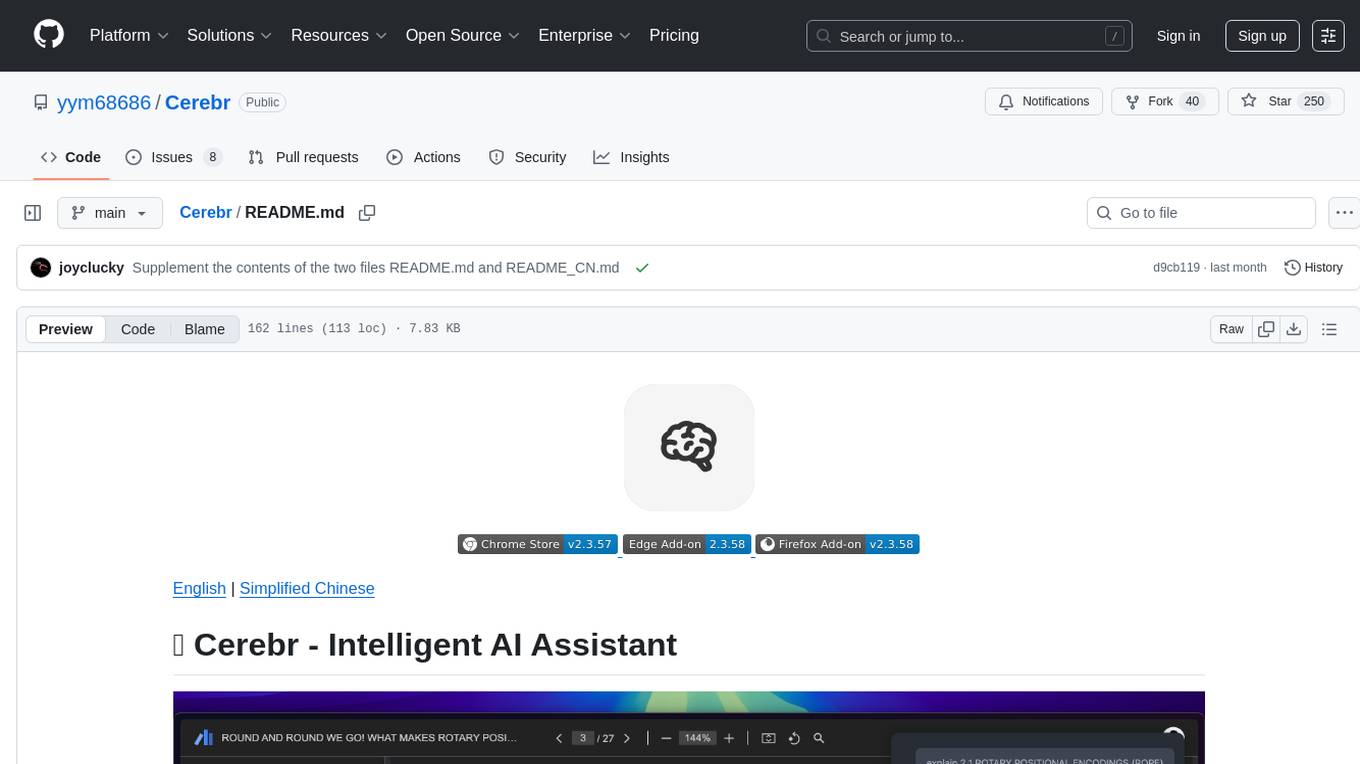
Cerebr
Cerebr is an intelligent AI assistant browser extension designed to enhance work efficiency and learning experience. It integrates powerful AI capabilities from various sources to provide features such as smart sidebar, multiple API support, cross-browser API configuration synchronization, comprehensive Q&A support, elegant rendering, real-time response, theme switching, and more. With a minimalist design and focus on delivering a seamless, distraction-free browsing experience, Cerebr aims to be your second brain for deep reading and understanding.
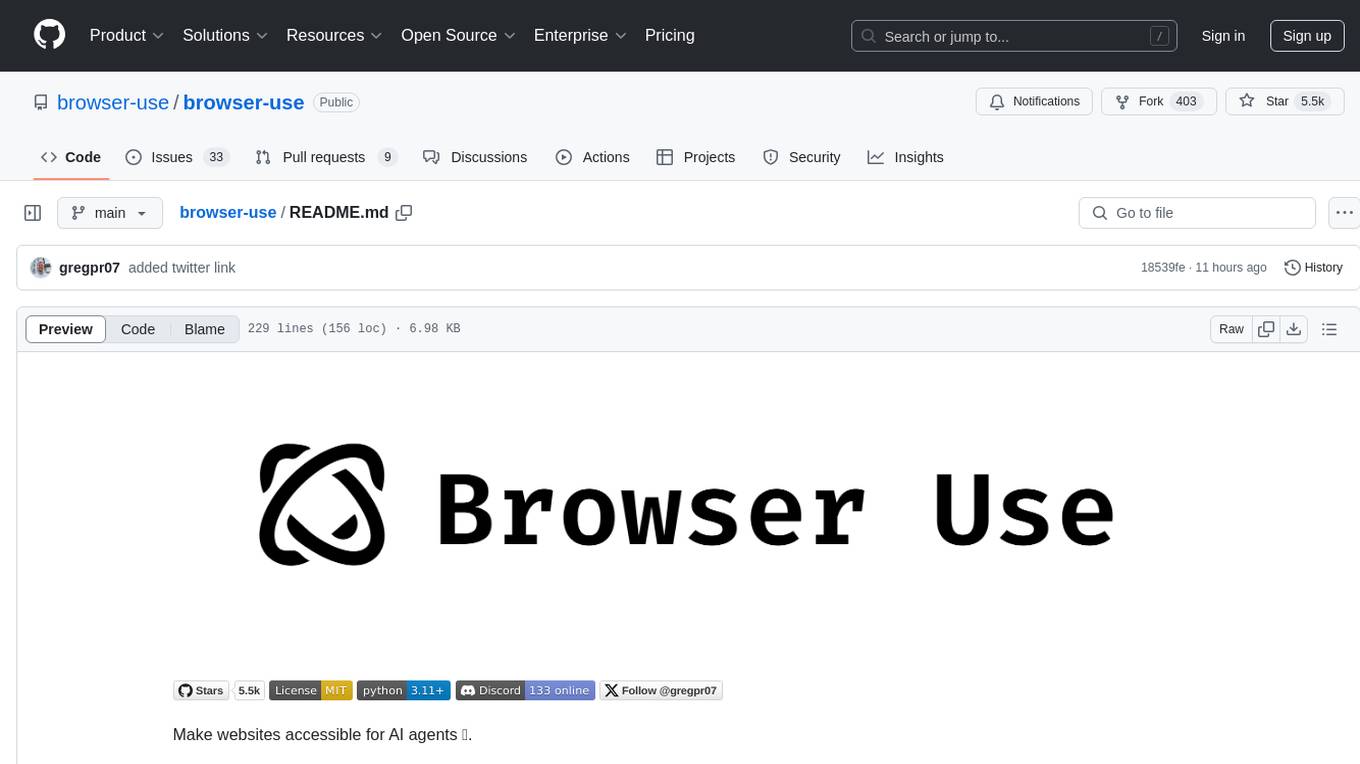
browser-use
Browser Use is a tool designed to make websites accessible for AI agents. It provides an easy way to connect AI agents with the browser, enabling users to perform tasks such as extracting vision and HTML elements, managing multiple tabs, and executing custom actions. The tool supports various language models and allows users to parallelize multiple agents for efficient processing. With features like self-correction and the ability to register custom actions, Browser Use offers a versatile solution for interacting with web content using AI technology.
For similar tasks

Magick
Magick is a groundbreaking visual AIDE (Artificial Intelligence Development Environment) for no-code data pipelines and multimodal agents. Magick can connect to other services and comes with nodes and templates well-suited for intelligent agents, chatbots, complex reasoning systems and realistic characters.

danswer
Danswer is an open-source Gen-AI Chat and Unified Search tool that connects to your company's docs, apps, and people. It provides a Chat interface and plugs into any LLM of your choice. Danswer can be deployed anywhere and for any scale - on a laptop, on-premise, or to cloud. Since you own the deployment, your user data and chats are fully in your own control. Danswer is MIT licensed and designed to be modular and easily extensible. The system also comes fully ready for production usage with user authentication, role management (admin/basic users), chat persistence, and a UI for configuring Personas (AI Assistants) and their Prompts. Danswer also serves as a Unified Search across all common workplace tools such as Slack, Google Drive, Confluence, etc. By combining LLMs and team specific knowledge, Danswer becomes a subject matter expert for the team. Imagine ChatGPT if it had access to your team's unique knowledge! It enables questions such as "A customer wants feature X, is this already supported?" or "Where's the pull request for feature Y?"

semantic-kernel
Semantic Kernel is an SDK that integrates Large Language Models (LLMs) like OpenAI, Azure OpenAI, and Hugging Face with conventional programming languages like C#, Python, and Java. Semantic Kernel achieves this by allowing you to define plugins that can be chained together in just a few lines of code. What makes Semantic Kernel _special_ , however, is its ability to _automatically_ orchestrate plugins with AI. With Semantic Kernel planners, you can ask an LLM to generate a plan that achieves a user's unique goal. Afterwards, Semantic Kernel will execute the plan for the user.

floneum
Floneum is a graph editor that makes it easy to develop your own AI workflows. It uses large language models (LLMs) to run AI models locally, without any external dependencies or even a GPU. This makes it easy to use LLMs with your own data, without worrying about privacy. Floneum also has a plugin system that allows you to improve the performance of LLMs and make them work better for your specific use case. Plugins can be used in any language that supports web assembly, and they can control the output of LLMs with a process similar to JSONformer or guidance.

mindsdb
MindsDB is a platform for customizing AI from enterprise data. You can create, serve, and fine-tune models in real-time from your database, vector store, and application data. MindsDB "enhances" SQL syntax with AI capabilities to make it accessible for developers worldwide. With MindsDB’s nearly 200 integrations, any developer can create AI customized for their purpose, faster and more securely. Their AI systems will constantly improve themselves — using companies’ own data, in real-time.

aiscript
AiScript is a lightweight scripting language that runs on JavaScript. It supports arrays, objects, and functions as first-class citizens, and is easy to write without the need for semicolons or commas. AiScript runs in a secure sandbox environment, preventing infinite loops from freezing the host. It also allows for easy provision of variables and functions from the host.

activepieces
Activepieces is an open source replacement for Zapier, designed to be extensible through a type-safe pieces framework written in Typescript. It features a user-friendly Workflow Builder with support for Branches, Loops, and Drag and Drop. Activepieces integrates with Google Sheets, OpenAI, Discord, and RSS, along with 80+ other integrations. The list of supported integrations continues to grow rapidly, thanks to valuable contributions from the community. Activepieces is an open ecosystem; all piece source code is available in the repository, and they are versioned and published directly to npmjs.com upon contributions. If you cannot find a specific piece on the pieces roadmap, please submit a request by visiting the following link: Request Piece Alternatively, if you are a developer, you can quickly build your own piece using our TypeScript framework. For guidance, please refer to the following guide: Contributor's Guide

superagent-js
Superagent is an open source framework that enables any developer to integrate production ready AI Assistants into any application in a matter of minutes.
For similar jobs

sweep
Sweep is an AI junior developer that turns bugs and feature requests into code changes. It automatically handles developer experience improvements like adding type hints and improving test coverage.

teams-ai
The Teams AI Library is a software development kit (SDK) that helps developers create bots that can interact with Teams and Microsoft 365 applications. It is built on top of the Bot Framework SDK and simplifies the process of developing bots that interact with Teams' artificial intelligence capabilities. The SDK is available for JavaScript/TypeScript, .NET, and Python.

ai-guide
This guide is dedicated to Large Language Models (LLMs) that you can run on your home computer. It assumes your PC is a lower-end, non-gaming setup.

classifai
Supercharge WordPress Content Workflows and Engagement with Artificial Intelligence. Tap into leading cloud-based services like OpenAI, Microsoft Azure AI, Google Gemini and IBM Watson to augment your WordPress-powered websites. Publish content faster while improving SEO performance and increasing audience engagement. ClassifAI integrates Artificial Intelligence and Machine Learning technologies to lighten your workload and eliminate tedious tasks, giving you more time to create original content that matters.

chatbot-ui
Chatbot UI is an open-source AI chat app that allows users to create and deploy their own AI chatbots. It is easy to use and can be customized to fit any need. Chatbot UI is perfect for businesses, developers, and anyone who wants to create a chatbot.

BricksLLM
BricksLLM is a cloud native AI gateway written in Go. Currently, it provides native support for OpenAI, Anthropic, Azure OpenAI and vLLM. BricksLLM aims to provide enterprise level infrastructure that can power any LLM production use cases. Here are some use cases for BricksLLM: * Set LLM usage limits for users on different pricing tiers * Track LLM usage on a per user and per organization basis * Block or redact requests containing PIIs * Improve LLM reliability with failovers, retries and caching * Distribute API keys with rate limits and cost limits for internal development/production use cases * Distribute API keys with rate limits and cost limits for students

uAgents
uAgents is a Python library developed by Fetch.ai that allows for the creation of autonomous AI agents. These agents can perform various tasks on a schedule or take action on various events. uAgents are easy to create and manage, and they are connected to a fast-growing network of other uAgents. They are also secure, with cryptographically secured messages and wallets.

griptape
Griptape is a modular Python framework for building AI-powered applications that securely connect to your enterprise data and APIs. It offers developers the ability to maintain control and flexibility at every step. Griptape's core components include Structures (Agents, Pipelines, and Workflows), Tasks, Tools, Memory (Conversation Memory, Task Memory, and Meta Memory), Drivers (Prompt and Embedding Drivers, Vector Store Drivers, Image Generation Drivers, Image Query Drivers, SQL Drivers, Web Scraper Drivers, and Conversation Memory Drivers), Engines (Query Engines, Extraction Engines, Summary Engines, Image Generation Engines, and Image Query Engines), and additional components (Rulesets, Loaders, Artifacts, Chunkers, and Tokenizers). Griptape enables developers to create AI-powered applications with ease and efficiency.


